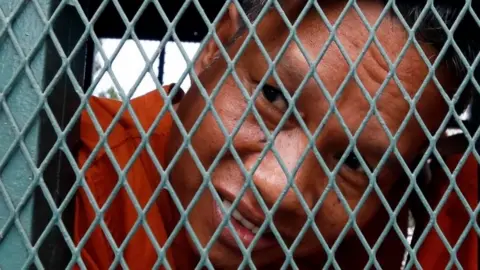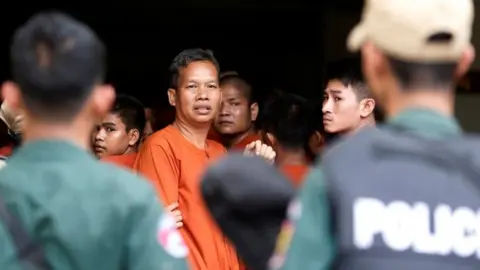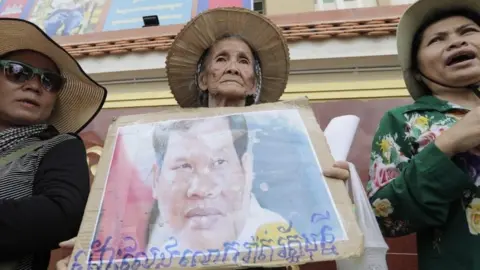Cambodia translator jailed over 'fake news' sex trade documentary
 Reuters
ReutersA Cambodian translator has been jailed for his role in a documentary about sex trafficking on Russia's RT news channel.
Rath Rott Mony worked on "My Mother Sold Me", a film released last year about impoverished girls sold into the sex trade by their mothers.
The Cambodian government branded the film "fake news".
The translator was given two years in jail and ordered to pay around $17,500 (£13,800) to two of the mothers.
RT said it was "extremely disappointed" with the verdict.
Rights group Human Rights Watch accused the Cambodian government of trying to hide the effects of poverty in the country.
How did the case come about?
"My Mother Sold Me" quickly went viral in Cambodia after it was uploaded to YouTube in October and officials launched an investigation over its claims.
A mother and daughter featured in the documentary were taken in for questioning and officials later said they had admitted to being paid to lie. Authorities also complained that the film was "fake news insulting the nation".
Rath Rott Mony, who is also a union leader for construction workers, was arrested in Thailand and sent back to Cambodia last year as he attempted to travel to the Netherlands after the documentary aired.
In court on Wednesday, the judge convicted of him incitement to cause discrimination, without elaborating.
What reaction has there been?
Keo Malai, a mother who appeared in the film, told Reuters after the verdict that she had been conned by the translator.
"I didn't sell my daughter and Mony told me to say negative things so that there would be more funding," she said.
However his wife Long Kimheang said her husband had only worked as a translator and the court's decision was "not justice".
 Reuters
ReutersRT, formerly called Russia Today, said it was in constant liaison with authorities throughout filming and maintained it upheld the "highest standards".
"We have been doing everything we could to help resolve the situation around Mr Mony's arrest, including via diplomatic channels," it said in a statement.
Human Rights Watch called the ruling an "affront to media freedom" and accused the government of attempting to cover up the crushing poverty that pushes families into sex work.
"The push to imprison Mony is an example of Cambodia playing 'shoot the messenger' of a person who told the international community about an inconvenient reality the government wants to hide," said deputy Asia director Phil Robertson.
 EPA
EPA"The sex industry in Cambodia includes girls under 18 and the government officials are failing to adequately act to address it," he added.
Prime Minister Hun Sen's government has increasingly targeted independent media, shutting down critical radio stations and news outlets. Critics say the country is sliding towards dictatorship.
Cambodia is ranked 143rd out of 180 countries for press freedom and its court system is also notorious for its lack of independence from the ruling party.
